#because these are nobles and their actions may reflect on their family.
Explore tagged Tumblr posts
Text
Just a short post on the topic, since I intend to reserve the long version for my culture sideblog where this kind of post should belong:
Since many people (esp people in the west) tend to misunderstand what “Mandate of Heaven” really is, I’ll just explain it in a concise way. “Mandate of Heaven”, or 天命, which really should be translated as the “Will of Heaven” or “Heaven’s Will”, actually reflects “the will of the people”. I’m too lazy right now so I’ll just copy paste what I wrote in an addendum to someone else’s post:
Instead, "heaven" is better understood as "nature", one which can "reflect" the opinion of the people like a weird mirror of sorts. To understand what Mandate of Heaven means, one absolutely must understand what "Unity of Heaven and Humanity"/天人合一 means. In this concept, the opinions, thoughts, and actions of humans (not just ruling class people) are echoed by "heaven". Which means that, yes, this concept is really all about the people. Ideally, anyway. This also means that every time a natural disaster happened, it was seen as the people's discontent or the ruler's mistakes/wrongdoings reflected in nature. Thus, we see that when natural disasters happen in history, the emperor might issue a public confession (called 罪己诏, or "Edict of Self-Blame"), in the hopes that "heaven" (people by extension) might cease its wrath. Sometimes these "signs from heaven" were also used as justifications for rebellions and uprisings like OP mentioned above, sometimes also usurpations.
And:
Now we come to the part of why I said "ideally". In ancient China, there was a special social class that held just as much power as the emperor (sometimes even more than the emperor, for example the Three Kingdoms period). This class was called shi/士 (sometimes translated as "scholar officials" or "literati"), and may be understood as the class of "elites" in ancient China. Shi elites often exist in the form of clans or families who have a sort of "monopoly" on governmental positions, and they are not simply rich people or landowners or nobles. Most importantly, they have knowledge, and they can control the dispersal of knowledge. It was the shi elites who came up with this concept of "Unity of Heaven and Humanity", which meant they have the final say in what the "signs from heaven" actually meant. In theory, the "humanity" in this concept should encompass all people, but in practice, it really only meant the shi elites. So in the end, it was a nice idea, but its overwhelming reliance on human interpretation made it so historically the situation often became a tug of war between the ruler and the shi elites, and not the people putting a check on the actions of the ruling class.
To add on to that, here are more concepts associated with 天/Heaven:
天 (Heaven): Heaven in traditional Chinese thought represents the supreme morals and natural laws of the universe, and is not a god (which means it is also not “the” god). It’s above all gods. It does not have a form and unlike many other deities in Chinese religions and culture, is not visually anthropomorphized. It is also different from 老天爷 (”Old ‘Ye’ Heaven”) in common vernacular.
天道 (Heaven’s Way): the natural laws by which everything in the world exists, operates, and changes. Can also mean causality, as in the phrase “天道轮回,报应不爽” (”The Way of Heaven cycles around, and retribution will come sooner or later”; the implication is that if one does bad things, because of this cause and effect it will eventually come back to bite them in the ass).
天行 (Heaven’s Workings): literally the way Heaven operates, or just the laws of nature. As in “天行有常,不为尧存,不为桀亡” (”Heaven’s Workings is constant; it shall not exist because of a benevolent ruler like Yao, and shall not disappear because of a tyrannical ruler like Jie”) from 《荀子·天论》.
天理 (Heaven’s Principles): the natural laws of the world, the supreme morals, and the ultimate truth. Often used as the ultimate moral basis, as in “天理昭彰” (”Heaven’s Principles are clear and evident”; means that Heaven will uphold justice, punish those who are evil and reward those who are good).
天命 (Heaven’s Will): the will of nature (which includes all people). See above.
#mandate of heaven#chinese philosophy#chinese culture#天#天道#天行#天理#天命#may delete when i actually come out with the longer post on the sideblog
304 notes
·
View notes
Note
On the Winx Club reboot... Lightrock? Also, how does it go for Diaspro? In the early seasons, the poor girl always gave me the impression most of her bitchiness was caused by knowing she'd have to spend her life saving Sky and Heraklion from his recklessness (and eventually snapping when he was about to risk a civil war to marry Bloom), plus Bloom being revealed a princess suddenly stripping her of the one working solution to the love triangle she knew, that is marrying Sky for duty and let him have the red-haired commoner as a lover.
Diaspro my darling!! She deserved better lmao.
this is gonna get long so
So like.
Diaspro is from a high-ranking noble family on Eraklyon, and her parents have some deal going on with the Royals for her to marry Sky. This has been a fact of life for her for as long as she can remember.
Now, Diaspro does care about Sky. She grew up with him. She thinks she's in love with him because she's supposed to be. Because she never had a choice not to be.
She never really had a choice for much of anything, really. She was to be Sky's trophy wife. She didn't really need to do anything, he'd take care of it all. She could have a hobby here or there, something to entertain herself. But why bother worrying about a career or politics or anything when Sky will do it for her?
Sky breaks out of this mindset earlier and has tried to do more gentle rejections. But things kinda. Explode out of hand. Because when we're in Season 1 we have Sky and Brandon doing their swap thing, then Diaspro shows up and blows their cover and introduces herself as Sky's fiance when he's dating Bloom and....
Like he explains before anyone gets too mad at him, and it's. Being confronted with Sky actually dating someone else is the first time it really hits Diaspro that he may not actually want her, ya know?
Which. Has her hurt and confused because she literally doesn't have anything else in her life except being his future wife. And she does initially take that out on Bloom, seeing it as a 'he would be happy with me if it weren't for you!' thing.
This doesn't last long though. Because Sky puts his foot down on a lot of things as he's like. Aware of the problems on Eraklyon and wants to fix things and wants to actually be a good King to his people. (Like remember what I said about his parents being kinda assholes? And the reason for the Sky-Brandon swap is a whole 'political unrest that is causing assassination attempts' thing.)
Anyway.
During the end of Season 1 and the inbetween of Season 1 and 2, Diaspro does a good bit of thinking and reflecting on Sky's words and actions, and the potential freedoms opening up if she can be whatever she wants instead of just 'his wife'.
While her acceptance of this is shaky at first, she does start looking at the prospect of getting her life on track without him. Ofc her parents wouldn't let her actually do that but... well. If she tells them 'how about you let me enroll in Alfea so I can be closer and keep an eye on Sky and try to win him back from that harlot's clutches?', then they're totally gonna throw money at her education.
She has little intention of actually doing so and is like. Quickly dragged into the friendgroup during Season 2 because they realize she's actually going to be incredibly helpful to have. (her powers are earth/rock-based and they're going underground).
13 notes
·
View notes
Text
I. have thought about doing it for a while. and the recent drama's multiplied it. so, even if it's unusual for me,
an analysis of Mlynar Nearl (and the Nearls' arc as a whole) and Why He Is My Premium and Beloved Babygirl.

tbh at first I almost hated him when I read Maria's event. he seemed like an arrogant holier-than-thou asshole and I was like, you know what? fuck you for me and my little girl! she just wants to be a knight like her sister!

but in Near Light, I started to like him. he was just so tired, so hopeless. he said he was dissapointed, but asked his friend to protect his nieces. his said he didn't care, but protected the Infected under assassins' attack.

and then I thought, he lies. constantly, but mostly to himself. because he's not an arrogant asshole. he's just... so bad at feelings.
so deeply broken.
and now the Obscure Wanderer arrived and Oh My God.
first of all, there're multiple times when he says the exact opposite to what he does, so let's take this knowledge and come back to the start, Maria's event.
he doesn't say "you're weak and useless to defend our glory" or "your sister is better than you" like I thought at the time. no, he tries to say, he wants her not to risk her life. not to let the system break her light like it broke almost everyone in his family.

his brother and sister-in-law were great knights that fought for the glory of their country, and now they're gone. the system threw them away like garbage. his niece fought for their family, for the chivalric ideals, and she was hunted and then exiled.
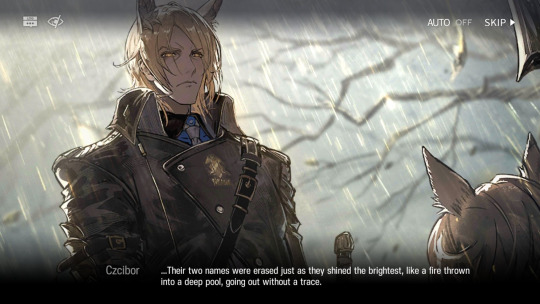
and finally, Mlynar himself. an idealist that found out, there's no point in fighting the capitalism. there's no hope. and between losing life in endless conspiracies and losing himself working for corporations but helping his family to survive, he chose the latter.
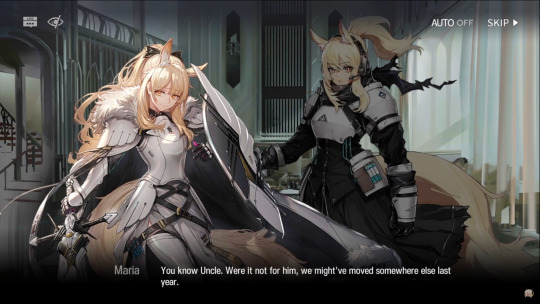
but Maria didn't need to choose. she could be free of the weight of the noble titles, of the useless principles, and yet she chose to fight - and almost got killed, if not for her sister.
of course Mlynar was pissed.
moreover, he was pissed because Margaret came back in the first place. she could have live a happy life far away from this rotten place. she didn't need to risk all of it for the country that will never remember her efforts. he was afraid for her.

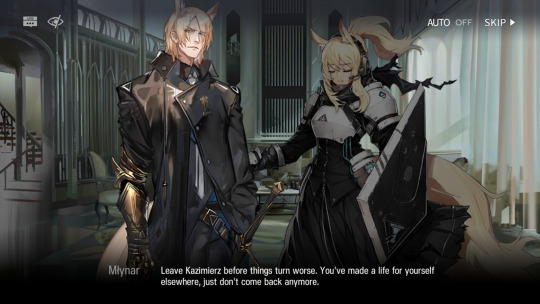
and then, Near Light. Nearl the Radiant Knight.
Mlynar saw her actions as a reflection of his own faults. Margaret tried to play the system's rules to change it, but Mlynar knew it was pointless. the system didn't care. the Radiant Knight will be forgotten, just like her parents.
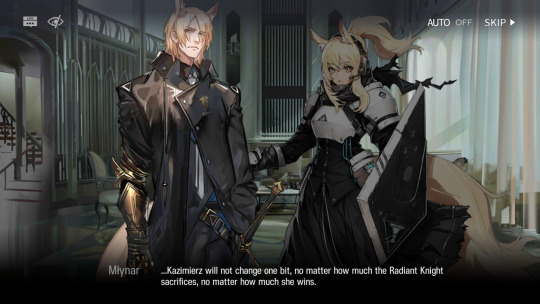
but when Margaret came back, she was different, and maybe she understood her uncle more then anyone.
she, too, saw defects of the system (how the Infected were treated). she, too, went through the war (with the Reunion).
but she didn't lose hope.
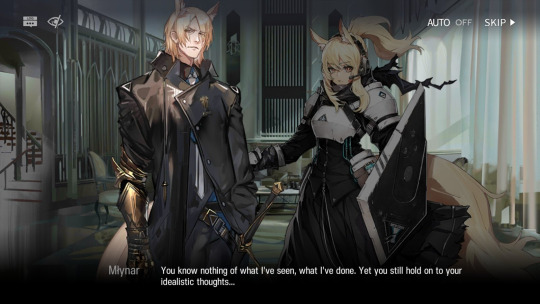
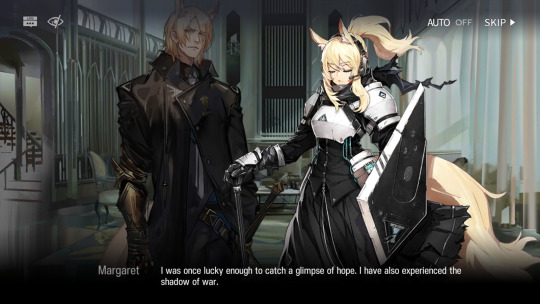
I may overanalyse it, but I guess she knew the power of the symbolic action because of Talulah. Talulah fucked up the Reunion, she lost, she was insane - and yet the Reunion didn't die in Chernobog, because Infected acknowledged that they can change the world.
and Margaret tried to do the same. it didnot matter if she won or lost. it didnot matter if her false infection was made public.
she was the Light in the Darkness. she stood up for the weak. she was a Knight.
and that awakened something in Mlynar.
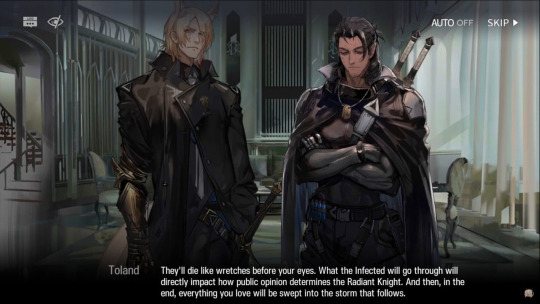
he decided to help the Infected so his family can leave in peace. to help the weak. to restore justice. to do the very same that he thinks a knight must do.
and so, he acknowledged the power of Margaret’s actions. that she really can change something. because she changed him.
she awakened hope in him, and he needed time to proceed it.


and so (in less than 800 words haha) I come to the main topic, Mlynar's event. and oh boy, this i-am-not-a-knight is more knightly that many.
he shits on knighthood not out of hatred for chivalry, but out of belief in it. the modern knights do not care about the weak, so he doesn't want to be a knight nor be called one. because he is not interested in fight, but in help.
and he doesn't want anyone to see it.

stop corrupted corporation of taking important task? what a naive assumption!
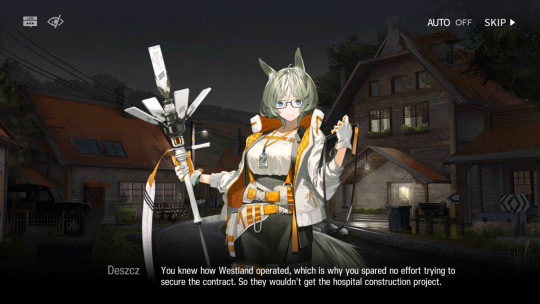
help two infected girls to stop the riots? pfft, what a joke.
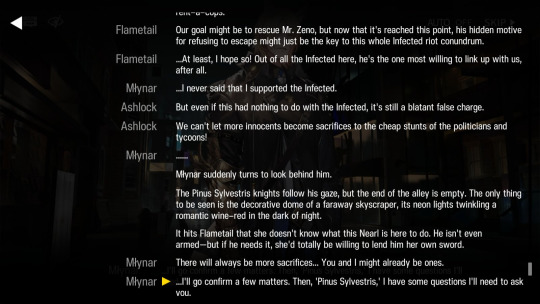
fight a corporation so they don't hunt an innocent? MAYBE YOU'LL ALSO SAY HE HELPED CHILDREN IN DANGER???
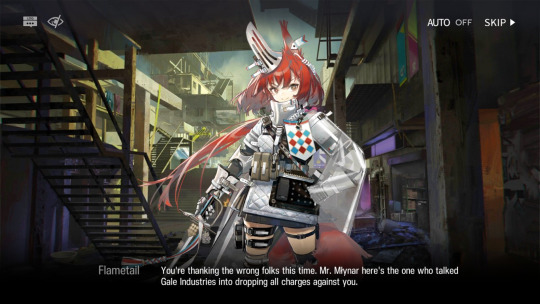
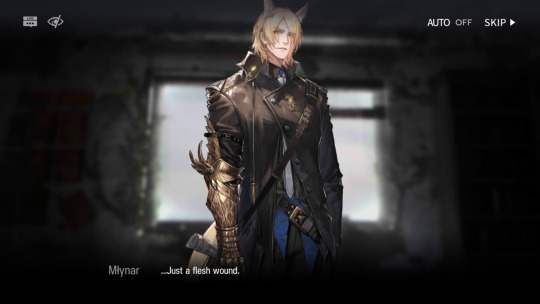
but unlike in his youth, he doesn't challenge the system, doesn't try single-handedly to change the world. small changes that can make a little better.
gentle light, not blinding.
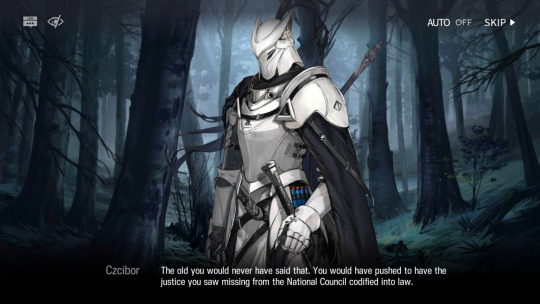

he hates what his country has become, but still - even as an ordinary man - even lying to himself - tries to make it better. that's why he want everyone to leave but himself. because deep down in his cynical, angry, depressed personality still lives an idealistic knight.
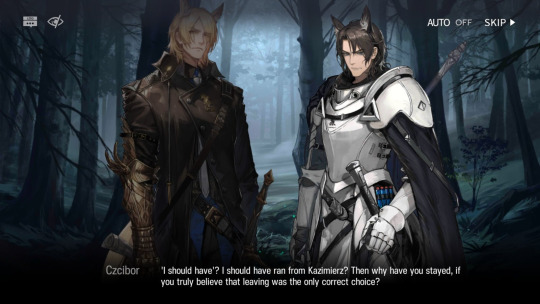

still lives a hopeful man that believes that his brother and his sister-in-law are alive. that his family can be whole again, even if no one else do.

he just cares for his family so deeply. he wants his nieces to live happily (somewhere else). wants them not to repeat his mistakes (even if it breaks their dreams). wants their parents back. he just can’t properly express himself.
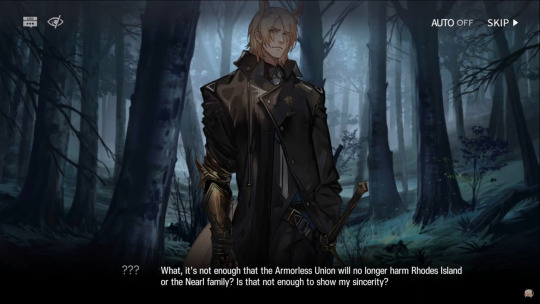
but the funniest thing? I think they know it. Margaret, because she knows how bad his trauma is. Maria, because she could see how office work and Margaret’s exile changed him. Zofia, because she knew him well enough.
and so, all of them were happy when he went to Rhodes Island. because they did the world better, and maybe will make Mlynar feel better.

as a conclusion,,, GOD his depression and burnout are so big. TAKE THIS MAN TO THERAPY. HONEYBERRY, SAVE THE DAY. I LOVE HIM SOOOO MUCH. MY GRUMPY ANGY BABYGIRL.
#Arknights#mlynar#Mlynar Nearl#arknights analysis#i love this oldman#wanna crush him in ly fist#also i love his 20 kinds of pissed off expressions#long reads#my analysis#???#i guess i'll use this tag
143 notes
·
View notes
Note
Once again I apologize in advance if this comes across as rude, I think it’s just how I talk lol.
I understand that Adam’s issue was not simply that hilled that human, or that that scene was the only reason he became evil, I know what his larger problems where but the narrative paints him killing that human in self defense as a reflection of said larger issues, as a sign of the dark path he was on.
Wether or not it was the first choice to kill Adam or fight the ace ops it was still shown to be the right choice, and not as signs of some larger issues with team rwby. Another example I forgot to mention was the happy huntresses
the white fang tried non-violence, they tried it for YEARS before sienna took over, sienna took charge because ghira’s methods weren’t getting the results the fuanus wanted.
Yo are right that sienna’s methods aren’t explored. and that’s very much part of the problem. The narrative simply accepts ghira’s methods without any challenge whatsoever. There is currently nobody who will challenge or even question his methods.
You are also correct that the white fang is not the only aspect of Blake’s character. In fact I agree that every other aspect was generally very well handled. But in regards to her activist side it really seems unlikely it will be improved even ignoring recent severely unfortunate revelations
Sorry to come across as rude, that wasn’t my intent and I do apologize for that,
Thank you; I appreciate it. Apologies for leaping to conclusions as well.
I think we'll have to agree to disagree.
I don't personally think the show has ever endorsed fullscale pacifism--I mean, the opening trailers involved all the girls fighting, but learning how to fight smartly. RWBY is not against fighting. RWBY is against treating people like pawns or collateral damage. Hence the consistent chess motif.
I genuinely do not think it frames the faunus as wrong for fighting and I don't understand how people seem to view "don't murder innocent people" as "just accept things." it frames Adam as wrong for using pain to create more pain. It suggests fighting to protect what you love and for equality is good. That's the climax of Volume 5, too--with Ilia, with the Belladonnas, with the faunus arriving at Haven.
In fact, Blake's whole arc is that she needs to fight. Her problem is that she runs. In volume 5, she needs to persuade the faunus to act.
Fighting is good in RWBY. It's just saying don't call killing other people noble or good, because it's not. And as much as I have issues with Adam's character, his death is seen as tragic--a relief, sure, but it's not something the characters cheer for. Some people wrote really good replies to my initial post that you may want to check out.
Adam's framing in that moment is only as you say if you take the events chronologically, but not the story. Meaning, if we lay out Adam's life step by step, yes, that's earlier. But if we look at the events in the order that the story reveals them, it's pretty late in the game. There's a reason we first learned about Adam through his relationship with Blake and his cult-like actions before we learned about that moment. You are supposed to see that as him revealing the parts of himself that we, the audience, already know are there, not as a plot twist that we didn't see coming that recontextualizes everything.
I think you may also be confusing the White Fang with the faunus. The majority of faunus are not members of the White Fang, and this is hammered home in Volume 5. The idea that the narrative accepts Ghira's methods without challenge is also not true according to canon and according to your own points; he lost his position in the White Fang because he wasn't effective, and almost had his family murdered. That is, simply put, a challenge. He only becomes more effective when Blake and Sun and Ilia help him. (We also haven't seen the faunus arc in Atlas play as much of a role; I would think it'd be capped off in Vacuo.) The point is that the faunus as a whole, including Ghira, have to fight.
And the narrative doesn't condemn Sienna either; her death is portrayed as wrong, and Ghira himself says that even if they didn't agree on methods, she was a powerful force for the faunus and they supported the same cause of liberation. That itself could of course be explored if it was a greater focus, but there's not time for it alas.
Anyways, those are my thoughts. I kinda don't have energy to continue this discussion, but thank you for weighing in, and for your explanation of your original asks. I hope you have a good day.
12 notes
·
View notes
Note
It’s so funny because Jaehaera died because Unwin Peake tried to do for his daughter the same thing Otto did for Alicent. It started with the Hand of the King making moves to pimp his daughter to the widowed king, and so like that it ends. Truly poetic.
I can already hear the comebacks: "Aegon III wasn't widowed like Viserys was!" or "Book!Alicent wasn't a child or 'underage' like Jaehaera when Alicent married Viserys!"
Not the point.
Jaehaera was like Alicent, but the girl was a literal, maddened child with no agency at all or ability to fight back as Alicent had. Through her father reducing her status in the line of succession and the war whittling down the people who could have protected her, Jaehaera was ultimately doomed for the similar reason that Rhaenyra was: her femaleness valued less than maleness. Jaehaera's only "usefulness" to anyone was her womb producing heirs that come from both the greens and the blacks. Her marrying Aegon was to prevent any green supporter or Alicent from using Jaehaera or any child she may birth against Aegon the Younger and drawing Westeros into another potential civil war. Once again, this part of the society does not care so much about noble girls and noblewomen apart from their reproductive labor, and actively discourages or tries tp prevent women and girls from living as their own persons/leaders (have agency or have similar powers and privileges as men/boys). This entire hierarchial system makes it much easier for disabled people, poor people, women & girls, etc. to fall victim to those seeking power; "power" comes down to how one (usually a man) has "claim" over other people's bodies & labor.
One of the green supporters in the war--who also was in the Caltrops meeting before the second Tumbleton battle--was the same one to have the only Green descendant left killed to make room for his own daughter to become queen to the current king and thus gain more power for himself and his house's glory and other benefits. Like Otto, he ignored the desires, will of the king (for him, which is Aegon III), and used the king's more vulnerable state of mind for his own purposes. Here the said state of mind was severe depression and being also a comparatively powerless child.
Jaehaera and Aegon III are clearly meant to echo Viserys and Alicent's and be the more vulnerable, choiceless couple. Why are they so vulnerable and choice-less, so unprotected? Well, who started this war by usurping a female heir, the only one left to a past king (for a time), and his first wife? (Jaehaera was Aegon III's first wife as Aemma was Viserys'.) Jaehaera's immediate family and faction, the greens. Who starred a war where all the dragons ultimately died and continued to die despite some people's efforts, thus denying these two children some sort of power they could have had against such predatory people like Unwin? The greens.
The greens ultimately so weakened the Targ dynasty (mind you, Alicent's four kids are all Targaryens with these own claims) in usurping someone -- because they wanted power for themselves and used the societal value of femininity and womanhood against said usurped person -- that one of their own, a girl herself, the last one, couldn't consolidate power for herself. nor was thought to deserve her own life unattached to the present king and the welfare of the entire realm despite her being a disabled child.
Unwin Peake was always mostly in it for himself and so chose the side that seemed to go for his own greedy aspirations. It reflected the Targ greens' and Alicent's greed and envy and was the consequence of the greens' actions. Both her and Aegon's conditions were consequences of their ancestors, including Viserys.
#asoiaf asks to me#unwin peake#jaehaera targaryen#jaehaera's death#the greens#fire and blood writing#fire and blood#fire and blood comment#asoiaf#the greens' characterizations#unwin peake's characterization#jaehaera targaryen's characterization
43 notes
·
View notes
Text
thoughts slash word vomit about sparkle // hsr 2.2 spoilers
i do overthink, but i genuinely keep wondering there's more to sparkle's role in the penacony arc (cf. her character, although there being more to her role would have to correlate to there being more to her character/personal motivations).
in all fairness i am all for her simply being a menace and looking for chaos, as aha themself seems to operate, and having no other ulterior motive; though it would be unconventional, it would be very true to her character were she to simply be "meaningless" in her role in this arc, aka a red herring—there only to incite suspicion when there was no harm, only fun, to begin with. it would be in line with her beliefs; it would be like sampo in belobog, not worth much with respect to the story and motives not so clear to the end. and i could get by that reality, because it does reflect her identity as a masked fool.
maybe it's really just because i'm used to conventional narratives that i find it hard to believe she has no other role than to be a little silly. "no useless characters", and whatnot.
to be fair, it's not like i think she might have a secret motive because "she's secretly kind and just wants everyone to be happy". she's terrible and immoral and that is what makes her a good villain (to me, if to no one else); she doesn't show sympathy towards "death" (although, maybe she's always known the truth? wouldn't be out of the question), nor is she hesitant in mocking people for their grievances, even race.
that doesn't mean she doesn't have a philosophy, though, and it's that philosophy that begets actions. thus far, too, it's clear she does have reason and ambition—she is far from the "meaningless" masked fools are often described in. we know she's passionate about acting and amusement. she also talks about working "behind the scenes", even mentions that her reason for being there has to be aligned with aha's reasons for sending her. laughter and amusement is not nihilism. as for what she'd do to get that Laughter?
data bank and SU index say that the elation would do anything, often invoking chaos or massive change, to bring joy and laughter to the world. in which case, the actions she is doing must revolve around making a huge change. yet she has done so little—of what we can see, anyway; she pushes us into the real dreamscape, yes, and she's been suggesting things to aventurine. was this her simple role, to be the imperceptible catalyst to change and destruction? then why does she keep appearing, still, with these mutually assured destruction buttons, when we hardly see them used either? or are they used, but we just did not see them? is her role in this arc, too, going to be something purely behind-the-scenes, something we'd never come to witness?
and then, on the deeper note: is the amusement watching the dream collapse, or is it something more inherent than that, more "noble", per se—like, say, spreading true elation? this may sound quite ironic considering people seem to be happy in the dreamscape, yet sparkle's going about revealing unhappy truths hidden in the dreamscape. but perhaps, does she believe true joy can only be obtained beyond the confines of a dream—in life?
it's a reach, i admit. but something else has been mildly bothering me that has led me to entertain this idea: sparkle's powers emanate from the Harmony. first i only thought it mildly interesting because penacony is governed by the family, and it was a nice coincidence. but in the 2.2 mission we got a new path for our trailblazer, after confronting sunday's ideals and being glanced upon by none other than xipe themselves. the power of paths said to be based on recognition, so it would imply that xipe recognized sparkle's beliefs— that it resonated with harmony. which i initially thought ironic, because followers of the elation typically are characterized by chaos.
but whereas chaos is the antithesis of order, it is not so the antithesis of harmony per se; in fact, you could interpret harmony as peaceful coexistence of differences (whereas, like sunday's ideals, order seems to be concerned with everyone believing in one structure, following Laws, rather than freedom amongst difference.) i'd think sparkle, too, respects that people live varying different lives (a thousand faces, etc); that she wouldn't want humanity's free will to be taken away, because it is against true Elation as she defines it. again, all conjecture, little evidence, just food for thought.
tl;dr: it bothers me— what she's really been doing (if she's doing anything substantial for the plot), the why's, what she really believes in... why she knows so much, says less than she can, why she keeps appearing (especially in this patch) with seemingly little reason.
and also: in the cutscene with a bunch of them, sparkle was lying down on the ground. WHY
i also wonder what the answer is if you'd chosen the fact about sparkle when we're unveiling that the first "ending" was a dream. whether it would tell you that's the flaw. because i chose the misha one and it immediately said that's the flaw. so i can't tell if there's only one right option or all of them would be correct. i'll search it up eventually! i'm Too Curious!
can't believe now i have to wait six weeks for another update that mAY NOT ANSWER MY QUESTIONS i genuinely hate this game.
#rambelles#honkai star rail#honkai star rail 2.2 spoilers#spoilers#sparkle#this thought train led me down a philosophical hole somehow#sparkle. the silly girl. made me Ponder Philosophy#in all fairness the mission was itself philosophical#meaning of life and all that#sparkle is still to me a true mystery#and i like that about her okay!!!!#obsessed#also can you tell i'm obsessed with the aeons#and the paths#and lore in general#thank you have a nice day
4 notes
·
View notes
Text
Im not sure if this is a joke or not. But I 100% agree.
Overcomplicated moral philosophy of why + rant and ramble below cut.
Of the two solutions (take out all playable races OR put all playable races in) they chose the more superficially profitable. A leaner book can go to print faster, requires less editing work, less art, etc. it takes up less shelf space overall and it can be sold for essentially the same price at this point.
But, the problem persists. The problem being that of fantastical moral progressivism. And, on the surface, that sounds bad to call a problem. But listen carefully. A monster exists for a reason. And what makes a monster?
When we define monsters as an exclusive group, we find way to integrate them into our own group without truly taking away their monstrous status. We see them as monsters with a people card and us as people. D&D 5e is already a game that deifies beings that hoard wealth (dragons), paints particularly beautiful people as wiser and better (elves), glorifies monarchical structures (kings/nobles), and so on. And some of that may be a stretch, it's part of the genre, after all. But so are monsters. Orcs and goblins serve a specific role in fantasy, they're the obvious evil (primarily for their grotesque appearance, like it or not) and their job is to be the kind of monster you can slay. You're not supposed think if the goblin has a family, and it's a lot easier to do when mechanically they're just a monster. Is that a good way to think about things, is that a bad way to think about things? I'm not going to get into that, because that's kind of the point. It's a game and it isn't supposed to mirror the real world, because it's escapist.
On the other hand, you solve the problem completely by admitting that anyone and anything has the potential to be a monster. There's no moral quandary if everyone can be a monster. If everyone can be a monster regardless of personhood, you skip all the steps if thought that complicate moral decisions on a meta level. Would your character steal and kill? If you wrote them that way, sure. Does it matter what they are? No. Anyone can do those things, and relegating those actions to a certain type of creature you call a monster implies that you think only certain kinds of creatures can be monsters and that by extension you can't be. It glosses over the other side half of why monsters exist in fantasy, they reflect stories about real dangers including dangerous types of people (people obsessed with money, narcissistic abusers, and tyrants).
When you make an orc a person without making humans monsters, you do begin to repair the racism inherent to the depictions but you also erase the function of the orc in fantasy (regardless of depiction): the evil crony brute. And I'm seeing a lot of evil crony brutes turning up in the world and trying to insist they're reasonable people and you should listen to them--the trouble is they don't actually look like orcs. Now, if we allowed humans to be the monsters too, it would be progress in the right direction.
So apparently they took orcs out of the new Monster Manual, and I get their reasoning. They’re in the Player’s Handbook now, and none of the others from that book, like elves or dragonborn, are in the Monster Manual.
But I think this was a mistake. There was actually another solution, something that literally every other edition of the game did. You want to be a return to the old ways, don’t you, 5e? I know you do you nasty little freak. So here’s what you should have done:
Put the other ones back in the Monster Manual.
3K notes
·
View notes
Text
Memorial of Our Lady of the Rosary
Reflection: The Samaritan’s Example
It is not uncommon to hear some people nowadays complain about erring civic and church leaders: “Where have all the few good men gone?” It would be good to remind ourselves that goodness is cultivated early on in one’s life.
Jesus’ Parable of the Good Samaritan in today’s Gospel reading challenges some aspects of our notion of goodness. Has it ever occurred to us that the act of the Samaritan was good not solely because he attended to the injured man but because this was something he had been doing all his life? Thus, what seemed to be one man’s random act of kindness—his attending to the injured man—was simply second nature to him. This benevolent gesture, however, was magnified when contrasted to the hesitation, if not the total indifference, of the priest and the Levite. By virtue of their race and religion, they are both naturally expected to rush to the aid of the injured man. Unfortunately, they did not.
Through this story, Jesus is trying to teach two things to the scholar of the Law. First, goodness is cultivated through the practice of good habits and noble character in our families. I don’t think the Samaritan started out his journey that day thinking about the good that he could possibly do for others. When the need arose, nevertheless, he was ready to respond in charity and mercy. He may have been immortalized for his charitable act, but to a selflessly good man, doing the right thing is a must.
Second, through the Samaritan’s example, we see that goodness is not only a habitual discipline that requires practice but also entails making sacrifices. Because the Samaritan took care of the injured man, he was inconvenienced and his journey interrupted. The Samaritan did not only bandage the wounds of the injured, but he also brought him to the nearest inn and provided for his immediate and subsequent needs. He went the extra mile to help the needy man.
Today, Jesus reminds us of the importance of cultivating goodness in our homes among our children early on in life.
~Fr. Rick Montañez, AA
How can you keep doing good until it becomes a reflex action?
Lord, help me to do good even if it means I have to go the extra mile. Amen.
Prayer
… for a deep and profound respect for life, especially for the unborn.
… for the strength and healing of the sick.
… for the healing and peace of all families.
Finally, we pray for one another, for those who have asked our prayers and for those who need our prayers the most.
GOD BLESS!
0 notes
Text
Reflection:
I’m feeling insecure about seeing the protagonists in Hirogaru Sky Precure take care of a baby.
Their actions are truly compassionate and noble, but the idea of the expectation to have a baby is something that scares me in the context of Seth and I as a couple.
It is absolutely something worth celebrating to create a child, but I also believe that not having a child is equally worth celebrating.
Being a parent must be a wonderful experience, and not being a parent is equally wonderful.
With the guarantee of eternal existence, I’m sure I want Seth and myself to be the only members of our nonphys “household.”
Partly because I do not feel comfortable guiding another creature in its existence. Mostly because I am entirely unwilling to share Seth’s affections in that way…or even mine.
This may be what’s right for Seth and I, but the idea of a traditional family is always a valid and beautiful choice as well.
I do not know how this variety of dynamic unfolds in a nonphys environment, but I suspect it would involve joining various realities as a group where either set roles are universal or everyone takes turns.
Maybe everyone even competes for their favorite roles, who knows?
But it could certainly become something of a game between friends and family.
Joining realities as a group is probably a lot of fun and probably challenging in different ways than joining solo, which is also its own ridiculously cool way to do things.
0 notes
Text
Religious Reflections - Luke 18:9-14

06/09/2023
Today’s designated Gospel reading from The Book of Common Prayer is Luke 18:9-14. The text is as follows in the NRSVue version of the Bible:
(9) He also told this parable to some who trusted in themselves that they were righteous and regarded others with contempt: (10) “Two men went up to the temple to pray, one a Pharisee and the other a tax collector. (11) The Pharisee, standing by himself, was praying thus, ‘God, I thank you that I am not like other people: thieves, rogues, adulterers, or even like this tax collector. (12) I fast twice a week; I give a tenth of all my income.’ (13) But the tax collector, standing far off, would not even lift up his eyes to heaven but was beating his breast and saying, ‘God, be merciful to me, a sinner!’ (14) I tell you, this man went down to his home justified rather than the other, for all who exalt themselves will be humbled, but all who humble themselves will be exalted.”
ANALYSIS:
An important message from this passage is to be humble. The Pharisee boasts about how “amazing” he is and how he is “better” than “bad” people while the tax collector comes before God acknowledging his faults and unworthiness. Even though it is good to live a noble and righteous life, one should not relish in comparing himself or herself to those who are seen as the “scum” of society or brag about his or her holiness being above others. One should humble himself or herself and realize that there are always aspects of his or her life that are lacking and can improve. It is through strength and establishment in the true wisdom of God that one can set a good foundation for his or her life and evolve to become a better person and help others to achieve betterment as well.
CALL TO ACTION:
My call to action from this passage is to be humble. Whenever you achieve greatness it is all right to share and celebrate your accomplishments, but do not boast too much or use your achievements to put others down because it will make them feel bad and make you look even worse. Realize that none of us are the “greatest” and that we all have faults to some degree, but it is okay to admit them and work to overcome these issues to become truly better individuals. We all may fall short sometime, but having a good group of friends, a supportive family, and a deep connection with the divine can help us to improve for the greater glory of God.
0 notes
Text
Stop justifying siblings hatred as an excuse for Sansa’s mistakes.
Sansa was wrong. Plain and simply. Her actions had negative consequences and her wrong judgment have got her where she is.
Unlike Jon, Bran, Arya, Danaerys, Tyrion,Theon, and even little rickon if we were able to see his POV they were drag to where they were yet remain true to themselves to the one they valued and love. They face so much danger yet they also exposed themselves to so much for protecting others who they believed where at a disadvantage when they themselves weren’t fare much better.
Sansa is a selfish character, and she continues to be one even to the last chapter in TWOW but that doesn’t mean there isn’t growth in her. She is changing her perspective and that is interesting to see. However, Sansa has a degree of responsibility to where she is right now.
Take Arya as an example. Arya took Yoren’s aid when Ned died even though she didn’t know who he was, she didn’t know if he would murder her, raped her, or sale her out.she took her chances because she knew she needed to get out. She saw through what Yoren told her about her losing her girl looks so that she may remain safer while in the road. However, that doesn’t mean she was safe.
She was starve, she had to see people be torture, raped, she suffer so much sexual harassment, beating. She had to work until the skin on her finger peel. Yet she still carried Wiesel, she still protected Gendry and the others.
Sansa had the chance to pick between little finger and the Hound. There is a connection between Sansa and the hound. He was the only person to protect her while in KL and she still took Little finger why because at least she would have food and live in a castle. Sansa even reflects on this. She wonder where she would be if she had taken the hounds offer. Has she help anyone in the novels other than herself? No. Have she taken a destiny turn thinking of others and how her decision may affect others no. Sansa has a very define personality in the nobles. Her fans refused to see who she is and they loved justifying her behaviour as naiveness, fear, immaturity and so on. But being unloyal is one that surrounds all of Sansa’s POV and plot just like it does on Theon.
In the Sansa tag there is a hybrid Sansa made by her own fans.
A weird combination of
Arya, Danaerys, Margaery and even Cersei in there.
They give her intelligence like Tyrion, Jon and Bran.
Give her leader a qualities found in Jon and Danaerys.
Maternal and protective family qualities found in Arya, Catelyn and Danaerys.
They mix show Sansa but they booster her so much and they don’t see Sansa in the books at all.
They want Sansa to be like Lyanna and they refused to see that in plain English George has written that lyanna used to behaved like Arya. She had Arya’s mentality since young. Ned recognized his sister in his younger daughter. While Catelyn can see herself in Sansa.
They don’t even understand who Sansa is.
But Sansa is a very childish, selfish, disloyal character. Yet loyal to herself. I give her that. She always thinks about her benefits before others which is not a bad quality to have but does not make a very liked characters.
My focus is book Sansa. No show Sansa. Dany!sansa, Arya!sansa, lyanna!sansa, fans!sansa, queen!sansa, or j0nsa!sansa, fansansa and or all mix together as they do in most of the informative tags found on the Sansa tag.
Sansa could never understand how two sisters, born only two years apart, could be so different. It would have been easier if Arya had been a bastard, like their half brother Jon. She even looked like Jon, with the long face and brown hair of the Starks, and nothing of their lady mother in her face or her coloring. And Jon’s mother had been common, or so people whispered. Once, when she was littler, Sansa had even asked Mother if perhaps there hadn’t been some mistake. Perhaps the grumkins had stolen her real sister. But Mother had only laughed and said no, Arya was her daughter and Sansa’s trueborn sister, blood of their blood. Sansa could not think why Mother would want to lie about it, so she supposed it had to be true. - Sansa, AGOT
Sansa loved Arya so much that she wished Arya was a bastard like Jon, awww 😍😍😍😍, Stark sisters foreva!! Truly, Sansa loves Arya so much. It’s just siblings being siblings to want one’s sister to suffer ostracization and be dehumanized as being less than simply on account of one’s birth. Such love! Truly. Can’t wait for them to meet and braid each other’s hair 😍.
130 notes
·
View notes
Text
Pick a Pile: Message from the Mermaids
Take a deep breath and choose one of the options below according to your intuition 💜✨💜✨💜
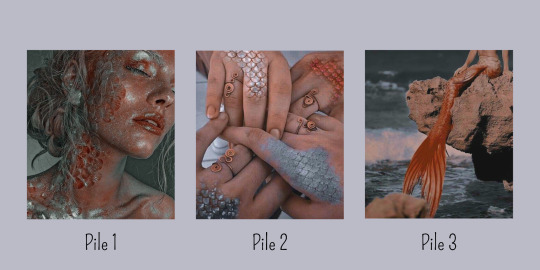
Pile 1 - Fertility
Potential, powerful creative energy, initiation energy.
We mermaids are creatures who bring to you now a powerful force: the power to create, begin, initiate and grow - some call it fertility and they consider it to be only to do with the act of conception - you are now a fertile being - a being who is ready and has all the energy, and richness and goodness needed to bring forth a great project. This is the moment of decision for you: will you use this great power, and seek out what it is you need to seed your own fertile waters?
We mermaids say that it may be time - that you have all that is needed, desired to richly provide life to creations, ideas, people, dreams... it is now time for you to decide how this will be worked with, used and explored.
You are a fertile, enriching being - and new life and growth is ready to spring from your mind, your emotions, your body and your soul.
Mermaids' tips:
- If you are having difficulties conceiving a baby you may need to balance your hormone levels, create a healing diet and series of exercises to support and nurture your own physical fertility and of course seek medical help.
- Do not let this fertile time come to nothing. Sew the seed of ideas, of dreams, and action them out into the world, into reality. The mermaids know you are the right one to bring this idea or being or project through.
Pile 2 - Freedom
Independence, self-determination.
Sometimes in life, we identify and define ourselves by the groups or organisations we belong to. Somewhere along the way, our unique energy can be muffled. With this card, we mermaids are asking you to consider who you are, when you are not a member of a family, or a relationship, or an organisation. It is time to be self-determined - rather than considering the needs of the group, which is noble and wonderful and ...oh, it is so good! We are asking you to be independent! To have, at last, your own source of money - just a small account will do, where you place money for your dreams.
To have a sense of who you are whether in or without a loving relationship! To know who you are - and what it is you love and like and wish for and dream of and desire for the world, apart from the desires of the family or group. Because the group mind, has, at this time, dominated, however gently, your own independence and self-determination. So take some time. Detach from the group. Watch. Observe. But go within, and feel. And begin to note what it is you wish for - and begin to contribute those dreams to the group. Too long have you kept silent about your needs and desires, placing others' before your own! When this card comes to you, we mermaids are saying it is your turn - but first you must get to know yourself, your true self, all over again.
Mermaids' tips:
- Ask yourself this very simple question...if you were alone, for a week, and there were no groups around to ask you to vote, or think, or look or be a certain way who would you be? It may be that you have changed your appearance, your beliefs and even your body to please or be more closely aligned with another.
- Don't change your appearance, interests, religion, and manners to fit into someone else's life or preferences.
Pile 3 - Farewell to the moon
Appreciate and enjoy the lunar light and cycles.
We love the Moon...for she is precious, and yet we are bidding her a long farewell, appreciating her energy. Humans are not so long-lived, and their priorities often reflect their lifespan, but we know the beautiful Moon is distancing herself little by little...and the power of the Sun grows stronger. So we connect as much as we can, when she is present. And if you too watch the sky and her crystal ball, you will feel the sea mother's tides and cycles dancing with the sacred moon's waxing and waning. That all in the Universe breathes as one. And that what is above, connects and affects what is below.
You humans too respond to the moon's tides, to the solar tides, to the galactic tides. The great ocean may respond more readily, but the firm earth also breathes in and out, as do the waters of this beautiful planet - all dancing with the Moon, and observed by this beautiful Being of the Sea.
Connect with her - for she moves you, always... come to know her, and you will know the mystery of life, without ever being able to speak it... it will live in your bones, blood and cells, in the water of your blood, and you will be free of the falsehoods of your human time, and come to know the times and cycles that are old, wise and powerful.
Mermaids' tips:
- Observe the moon. Be under her light. Withdraw with her darkening. Know what her phase was at the moment you first drew breath. It need not be complex. The simple connection will change you, so that your true essence can come forth and be known by the world.
- Trust more in your intuition and instincts instead of relying only on your logic.
- Ethereal High Priestess
#pick a pile#free tarot#oracle#pick a picture#tarot#tarot reading#witchblr#pick a card#spirituality#manifestation#mermaid#oracle reading
423 notes
·
View notes
Text
Can you believe!!! It's been three years!?! Happy anniversary to the Reforged Campaign!!! Today in 2019, some of our little blorbos met for the first time, gathering up some new friends along the way. We've been through so much together and I just wanna get gushy and talk about my lovely friends who have made this little fantasy game so enjoyable and have contributed to my D&D brain rot for all this time lol.
@army-of-bee-assassins Joyce, playing Whitlock: the axe-swinging, tubthumping, Fighter/Wizard of our dreams ✨️ There's a reason we've said that if you don't love Whitlock, you're wrong. While a badass in combat (I'll never forget the fireball that took out nearly a dozen ghuls at once 🤩🥰), outside of our intense fights, Whitlock is the epitome of kindness and caring. It only made sense that this care combined with his love of the arcane led him to the school of Abjuration, he is a protector through and through. One thing that continues to astound me about Whitlock is that even after almost drowning (multiple times) and losing his home and his whole old life to the seas, Whitlock still has fought for elementals who have been enslaved and mistreated, because that's who he is. He stands up for the little guy, even when the little guy may be much bigger than he is. He is selfless in his actions, some may call him reckless (like being the first to charge into an unknown encounter, even if his initiative score doesn't usually reflect that lol), but I wouldn't. I would call it faith, because he has faith in his skills and he has faith in his friends, to be there right behind him, as he is always behind them. Love our sailor boy, I am forever on Team Beans 💙
@lacklusterlexicon Alyx, playing Kempa/Eun Ha: the best shirtless dragonborn Barbarian bhimbo you could ask for⚡️Alyx first joined our group as a guest, playing the lovely tiefling druid Kaia and it was a pleasure to have hir at our side as we fought the terrors of the Shadowfell and the corruption it brought to the Prime Material. But as that mini arc drew to an end, we as players knew we had found something special with Alyx and knew we couldn't let them go so easily. It was then that we were introduced to Kempa (then Eun Ha) and it soon felt like she had been with us since day 1. Oh Kempa, my beloved Kempa. She had been through a lot before reaching our little group, things that made her angry and that rage fueled her fight. But the rage did not consume her, she instead used her pain to push forward, to try and find her lost friend, and found a new family in the course of that mission. Kempa can sometimes be the goofy jock barbarian stereotype, but she is so so so much more than that. She brings kindness and empathy into everything she does. When we learned a lackey that we captured and interrogated was just a person down on their luck looking to make a living, we could've just let them go and been done with it, but not Kempa. Kempa gave them money, not wanting to contribute more pain into an already harsh world. Sure she can shoot lightning out of her mouth and decapitate a bad guy with a single swing of her halberd, but the core of Kempa is compassion, listening to others to understand rather than just making harsh judgements. I'm glad to have her on our side 💙
@lichfucker Tess, playing Ingot the Feather-Light: the sharpshooting, noble-turned-hero tiefling Ranger/Rogue 🏹 Ingot Ingot Ingot, what's there to say about him (that I can say without crying lol)? From the outside, it may appear as though everything was given to Ingot on a silver platter, what with his noble upbringing and having received the highest standard of archery training. But to look at him through this lens would be to do the utmost disservice to his character. Ingot has worked for everything that he has. He was the one who chose to veer off the path his parents had set for him and for what reason? To stand up for a stranger, a prisoner of war who just so happened to be just like them, a tiefling. Since that day, Ingot started to become the person he was truly meant to be, his upbringing and any devil’s contracts be damned. The real Ingot is not a good little soldier boy who just takes orders from the war machine. No, Ingot is a fighter, using their bow and arrow when they damn well please. You do not want to be on the wrong end of Ingot's ire. But more than that, Ingot's learned to be a lover as well. Despite his cold upbringing, he has forged a new family of his own, one that loves him for him, not for what he can or can't do. Ingot is not a soldier, he is a friend, a damn good one at that, even when he may act like a bit of a bitch. It's okay, we still love him, and it has been an honor to be on Team Tief with him 💙
@keplercryptids JD, our dearest creative, dedicated, a little bit insane (affectionate), and all around amazing DM and friend 💚 Thank you for creating Z’ress and Mahety and Suri and Dagen and Lorne and Nabil and Najiba and Temza and Gell and Ohestra and Z'rael and Levsais and Cover and Ildan (🙄 /j) and Polodren (:fearhamster:) and just the whole entire world that is Sirona, and the planes beyond the material! This world you have created is expansive and feels so real that it makes it so easy to feel like we are our characters, walking through it and living out their adventures. Thank you for the weeks and months and years of hard work you have put into making out little fantasy game. Never did I think we'd have what we have now three years ago, that not only am I still involved with this super cool game, but I made long lasting friendships with some of the best people I've had the pleasure to meet (online at least, but hopefully soon we'll all be together!). You facilitated that, you brought us all together and have kept us together and that's not an easy feat for five adults lol. Thank you for the cool mechanical parts of this game that have been the most insanely fun encounters that really challenge us to think creatively, even when we may get stumped by a puzzle where the answer was we had to walk into an unlocked room to get a key 😅. Thank you for the world of NPCs with vibrant personalities and who are complex and complicated and messy and funny and interesting and loving. Thank you for their wisdom and their friendship. Thank you for your friendship, you've taught me a lot and I will value it forever. Thanks for just being awesome 💙
And last but not least, shoutout to JD's best friend, who played the gentle titan of destruction, Salvador, and @artemissoteira AKA Rowan, as Ithren (if that even is their real name lol) for joining us along the way as guests, who made our little world all the more special. I appreciate and love all of you. Here's to many more years in our funny little fantasy worlds 💙💙💙
#Eli Speaks#SICL#Reforged Campaign#this is long and rambly but I had to get it out#I just love my friends so much 😭😭😭#Joyce#Alyx#Tess#JD#Rowan#Long Post
15 notes
·
View notes
Text
owenstark:
.
“Of course. It is my desire to ensure we do what we can to keep those who follow the Faith of the Seven feel … close their gods in the North. I am uncertain of how that works.” Owen spoke curiously. He didn’t understand the new Gods, his wife came from the Vale and his sister Lyanna came to them from the Riverlands after years and it made him wonder if she also followed these new Gods.
Owen never sat down to have these hard conversations because he never knew where to start but he needed to know these things.
“For…I wish to understand. My wife’s way. Your future daughter will marry my son, a grandsire should know the ways of his grandchildren. My wife has taken to the Old Gods though I worry she is in need of her own just as much as I would be were I in the Vale. I trust your choices. Let us hope this current situation will reach a peaceful end. If it is possible when men fight over crowns be they wrought in iron, gold, or glass.”
A beat.

“Do you worry this corruption will hurt things in White Harbour? We are a world away in the North, it’s easy to drown out the sounds beyond the Neck when there is so much happening around us here. I say this to same should you need anything that I can provide to you as your King and your friend then I will do what I can.”
nmm.
The King of Winter had a valid question to ask regarding the mechanical ivy that spread within the Starry Sept, that tainted strand that would only become a perfect reflection within White Harbor's Sept of Snows, that great domed Sept within the centre of the city. All knew of the nature of the game of thrones within the South, where words were laced with what may as well be the tears of lys and faces looked one way but truly meant another; it was different for them in the North, where their reliance on the bluntness of truth was believed to be what made men, men.
“The people of White Harbor and the surrounding settlements do feel at ease to practice their faith.” His words were resolute, as though to assure the King that on the front, they were handled. “The majority of such isolation does not come from the actions of Lords, but would come from the actions of those we will never know.” Smallfolk interacting, merchants. “They are safe whilst you and your kin rule the North.”
These discussions did not entirely sit comfortably upon the shoulders of the ruling Lord of White Harbor, perhaps because he understood the heavy weight of those who looked to him for protection. It were more than ensuring they remained fed, it was about genuine protection: a minority, in a land where the nobles had no qualm with them. But what of the smallfolk? What of the thinking that never truly reached them in their positions in society?
“The corruption of the Starry does not harm White Harbor nor the Sept of Snows; Septon Fadel has maintained a close relationship with my family. As is the way.” There was another beat. “What will harm the people of White Harbor are other Northerners. Once this has been dealt with, it is about time we drew up laws. Make it a crime, with consequences. Allow justice to teach.”

And yet, the North seemed to underestimate the power that came in cunning, in playing the game of thrones in the way the South did; the bastard within the Dreadfort was only an example of such a thing. Lies did a great deal within the North, all without them truly noticing nor understanding. The North seemed to underestimate the power that came with progress, that came with unleashing practices and beliefs that were only present because the heavy weight of history rather than of it being of any true use. And yet, look at where it had gotten them.
He paused, wordlessly leaning over to take a goblet of wine as the two men sat in silence for a moment, listening to the crackling of the hearth. He were thankful that his King was understanding; understanding even of what he did not truly nor fully understand. It were better than nothing: showed the man beneath the crown. “Will you slow down your ideas?” Nasir asked, his tone quiet. The two had always agreed that modernisation was not soft: it was hard, like a slap in the face. The others, including Brandon Karstark, did not believe that as much.
11 notes
·
View notes
Text
Patch Notes!
I've been hard at work making changes to the actual demo and most of it is coding to set a foundation so that I may stop breaking the saves of my readers lol (I swear I'm almost there!!!).
Patch Notes:
"Reputation" Some patch notes include having a new addition to the Reputation menu bar! Reputation will be used as a meter for how famous you are, which includes your legend. Currently, you won't be seeing much reaction to your Reputation level, but once we get going at the Academy Arc, the potential to win and lose Reputation will be aplenty, especially afterwards of the Academy Arc! Example, after reaching the positive ends of some scenarios, you will start to become more renowned, leading to characters and npcs to remark upon your failures, or your successes. The Reputation menu will also house "Standing"!
"Standing" will be separated into 4 groups and measure how pro-something you are. Are you pro-noble? Pro-commoner? Pro-military? Or pro-merchant? The more you gain in standing with a political group, the more benefits and options given to you! Of course, being too pro-military will cause the merchant class to suspect you as a warmonger who only sees the merchants as piggy banks. Being too pro-merchant will cause your military to think you too soft and money-grubbing. Depending on your playthrough, and your goals for that playthrough, you will have to decide which political parties to cast your ambitions with. Only a high Politician MC will be able to securely navigate all the political factions and create a working, if strenuous balance.
"Stat Changes" Sooooo...I may have said screw it and chose to rewrite my stat systems! Stats will now be similar to the attribute system used by Fallout or the old Elder Scrolls series. Particularly, there will no longer be percentage bars representing your stats. Instead, they will be represented by a scale of 0 to 20. Your Education stats will be similar, also having a scale from 0 to 20. Because of this, it is required to start the game over and replay it from the start to get your stats in order. I will be making minor changes to the story (where you would gain attribute increases, it will now be that and/or education) to reflect the change. Along with this change is the inclusion of "Traits"!
"Traits" Traits are now included! This means that Personality stats will no longer be reflected off of percentage bars! It is my intention that players now choose two personality traits from the original 4 (Imperious, Stoic, Friendly, and Careless) and roleplay as using whatever combination you want. Say you wish to be Friendly or Careless with your friends and family, but Stoic or Imperious when the situation calls for more gravitas. Thats for the personalities, but for actual Traits down the line, you will be locked from certain dialogue trees or actions if you lack a certain trait! The Trait system will also be used for when you gain new skills and abilities, and will be gained by certain scenarios, your stay in the academy, and when you interact with the Champions in their Spiritual Domains when they impart ancient knowledge to you!
"Chivalry and Dread" The last topic for my patch notes is Chivalry and Dread! They are the replacement for Heroic and Cold! Inspired by Total War Medieval 2 and Machiavelli's The Prince, I decided to implement something interesting. In Total War Medieval 2, you can have generals that are Chivalrous and respected who are loved by their people and enemies, or have high Dread and make them a force of terror that may make men from the other side flee at mention of their name. Machiavelli in his book The Prince asks the famous question of "Is it better to be feared or loved?" Of course, that's up for you to decide as certain actions will increase your Chivalry or Dread stat up! Depending on which Trait you have, certain scenes will play out for you, characters will remark upon it, and there will be pros and cons for both sides! Chivalry and Dread will now be Traits as well! Meaning the MC will only be able to choose one trait and roleplay with it. A Chivalric MC will be much more idealistic and prone to making decisions that may bite them in the ass, while also giving you the opportunity for making friends and long-lasting good karma coming back to reward you unexpectedly. This is for a more traditional isekai experience! Think of all the isekai animes and JRPGs with the super nice MC. Dreaded MCs will be choosing decisions that may make you look more like an anti-villain than hero! Think of Vlad Tepes and his forest of impaled corpses that made Mehmed II turn right back. Finally, certain moments in the story will allow your character to choose either Chivalric or Dreaded without having the choices locked. Choosing opposite of your trait will incur a Mental Cohesion Hit!!!
66 notes
·
View notes
Note
Greetings!☆**
I would like to do a spell in order to help me win scholarships and find a nice part time job that grant me enough money to get away from my family. Need propels magic, but I can't yet bring myself to do something that might come to bite me in the ass later / may be unfair to others who are trying for the same thing.
What do you think about it? Of the moral side of it and the practical one...
Ahh, lovely!
This is one of the first ethical dilemmas I encountered when I very first got into witchcraft. The argument goes as such:
"As a witch, you cultivate abilities that others do not cultivate. These abilities give you a competitive advantage. This competitive advantage makes it more likely for you to succeed. Succeeding may be bad because it wasn't fated/you're stealing your success. Therefore, it is immoral to do magic unless it is an extreme or emergency circumstance."
Which is just the silliest.
The absolute silliest goose of an argument.
Once I was trapped in a very bad headspace. I told my therapist, "I know what the other person was feeling, I know what happened to them."
My therapist said, "no, you don't know."
At the time it was a slap in the face. Of course I knew; I was there, I saw it all happen. But after reflection I realized she was right.
I didn't know what other people were going through, I didn't know their backstories, I didn't know how they felt or what happened afterwords.
Instead, I assumed I knew, and used my assumptions of the disadvantages and pain of others as an anchor around my neck to prevent me from ever rising up and helping myself out of my own situation.
Do you know what unfair advantages the other candidates already have? Do you know the unfair biases the hiring managers already have? Do you know what wonderful goodness may come out of you getting the opportunities you need? Do you know what horrible badness may come out of the wrong person getting the wrong opportunity?
No, you don't. Deciding that it is unfair for you to help yourself because you have imagined what it might be like for hypothetical people to not get certain opportunities isn't a noble, ethical stance.
I think it is wise and considerate of you to take a step back and say, "how do my actions affect others?"
I do not think it is wise to say, "if I do what is right for myself, I am doing what is wrong for others." That doesn't track. Life is not a zero sum game.
As for the practical application side of things:
There are many ways to limit unintended consequences. A great way is to start with divination and understand the effects of your spell before you even cast it.
Another way is to really think through your spell, understand what you're asking for, and to use a limited number of powers/ingredients to formulate it. Too many spices in your first batches of soup may make very wrong flavors; best to get experience with each one first.
Also remember the old adage: magic follows the path of least resistance. Many magical "horror stories" come from people who raised up lots of energy with no possibility of manifestation, so it backfired; or, people who really didn't understand what they were asking for, and then got it. Think things through (which I see you already have a tendency to do!), go forward mindfully, and act with confidence.
And learning a counter-spell early on doesn't hurt ^-^
34 notes
·
View notes